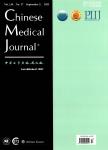Effect of surgical castration on risk factors for arteriosclerosis of patients with prostate cancer
手术去势对前列腺癌患者动脉粥样硬化危险因素的影响(英文)作者机构:北京大学人民医院泌尿科北京100044
出 版 物:《Chinese Medical Journal》 (中华医学杂志(英文版))
年 卷 期:2002年第115卷第9期
页 面:1336-1340,148-149页
核心收录:
学科分类:1002[医学-临床医学] 100201[医学-内科学(含:心血管病、血液病、呼吸系病、消化系病、内分泌与代谢病、肾病、风湿病、传染病)] 100214[医学-肿瘤学] 10[医学]
主 题:Aged Arteriosclerosis Humans Hyperinsulinism Insulin Resistance Lipids Male Middle Aged Orchiectomy Prostatic Neoplasms Risk Factors
摘 要:OBJECTIVE: To analyze the effect of castration on risk factors for arteriosclerosis of patients with prostate cancer. METHODS: Thirty patients with primary regional prostate adenocarcinoma limited to the prostate theca were selected in this study. Serum levels of testosterone (T), free testosterone (FT), dehydroepiandrosterone (DHEA), sex hormone-binding globulin (SHBG), prostatic specific antigen (PSA), triglyceride (TG), total cholesterol (TC), high density lipoprotein-cholesterol (HDL-C), low density lipoprotein-cholesterol (LDL-C), apoprotein alpha(1) (APOalpha(1)) and apoprotein beta (APObeta), insulin, plasma fibrinopeptide A (FPA), plasminogen activator inhibitor-1 (PAI-1) and fibrinogen were determined just prior to, 1 week and 1, 4 and 8 months after castration. RESULTS: T, FT and PSA decreased significantly 1 week after castration (21.12 +/- 15.11 ng/ml vs 383.9 +/- 62.6 ng/ml, P



